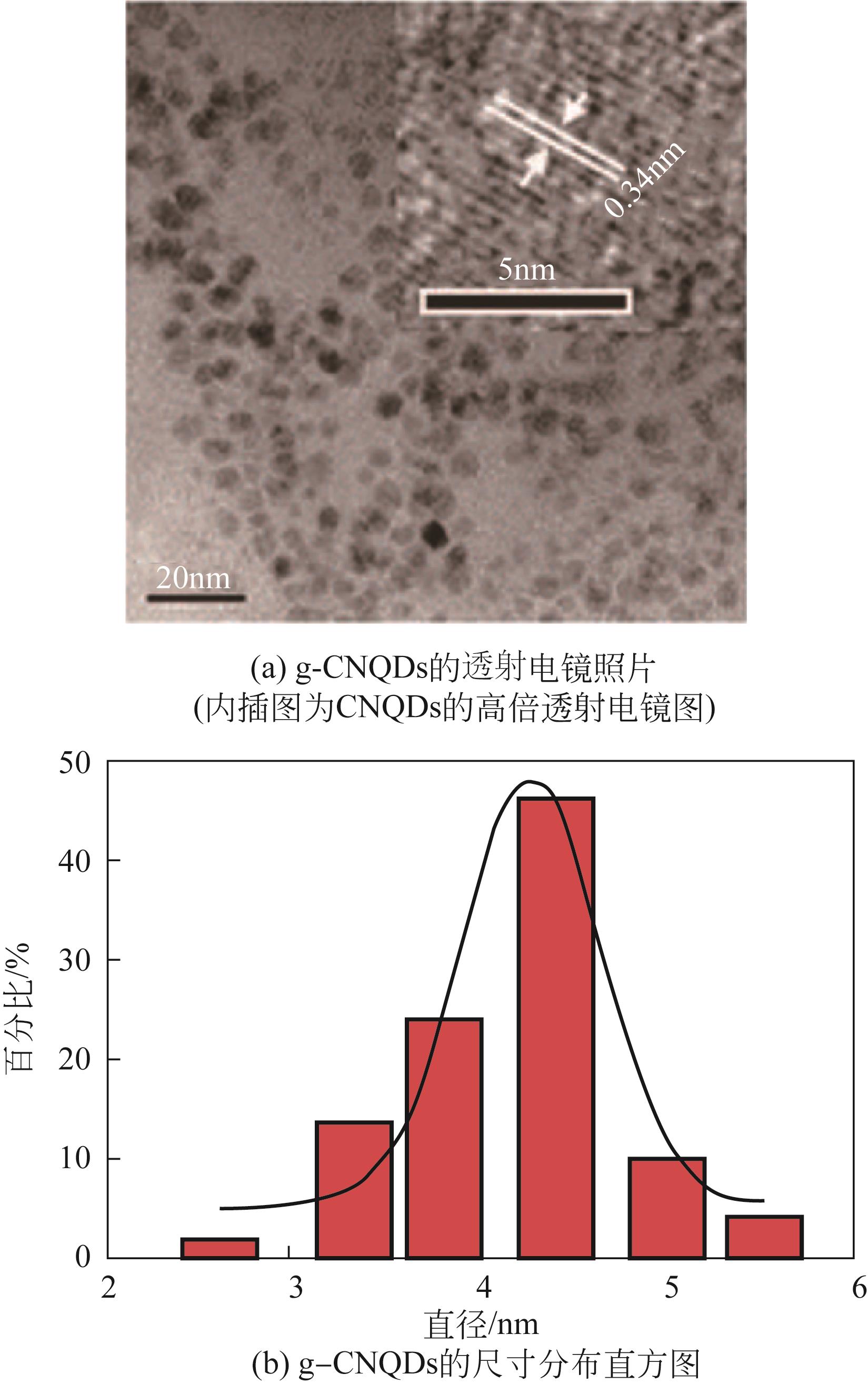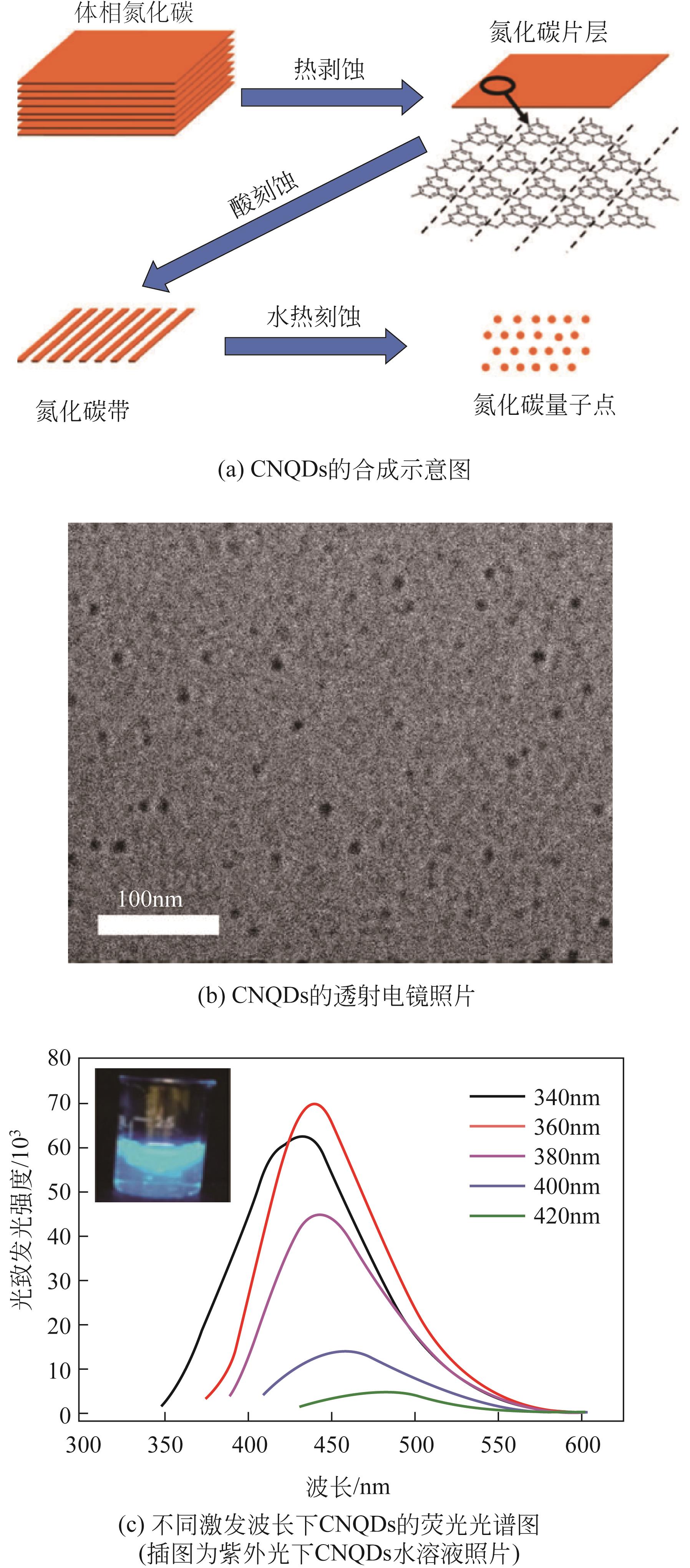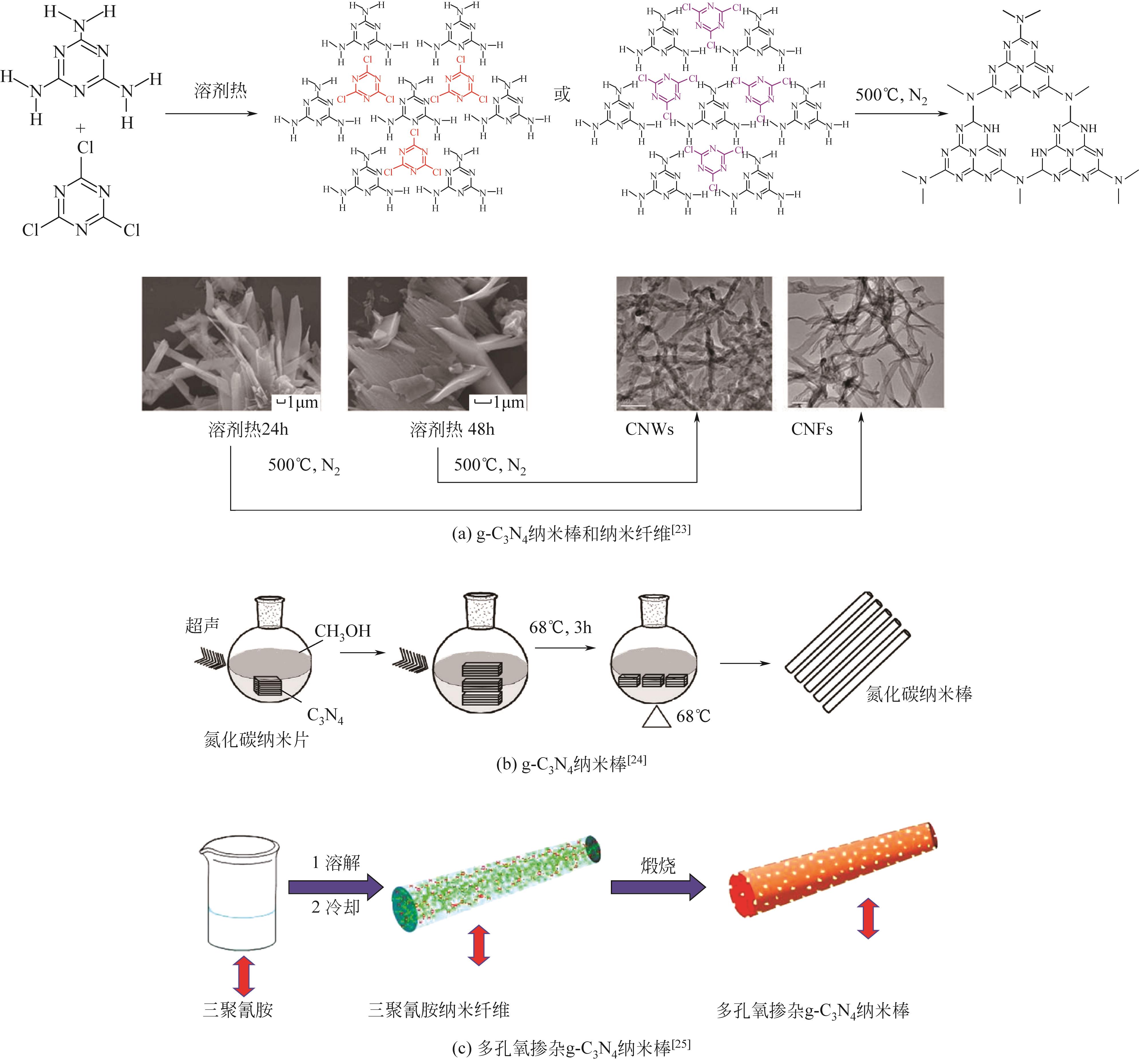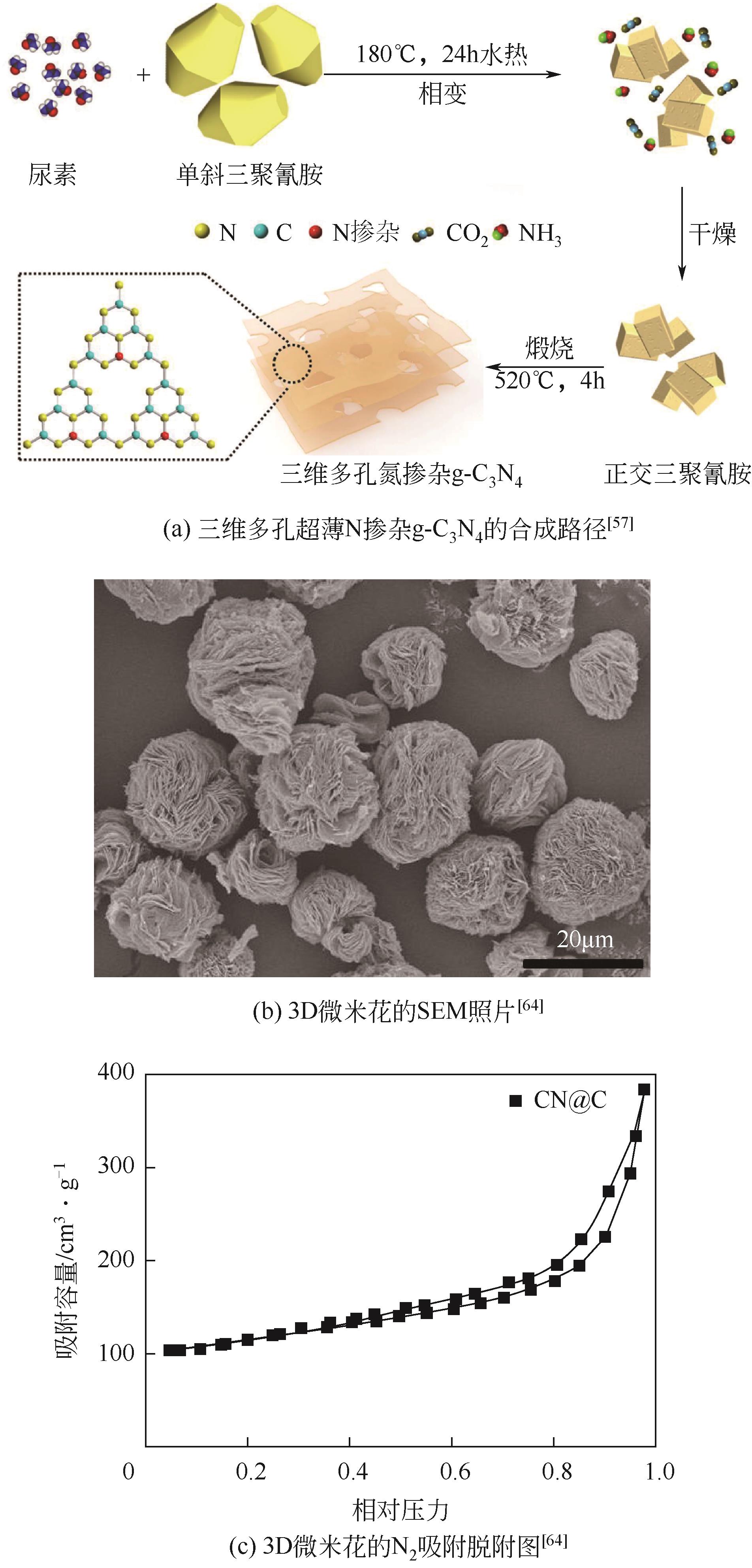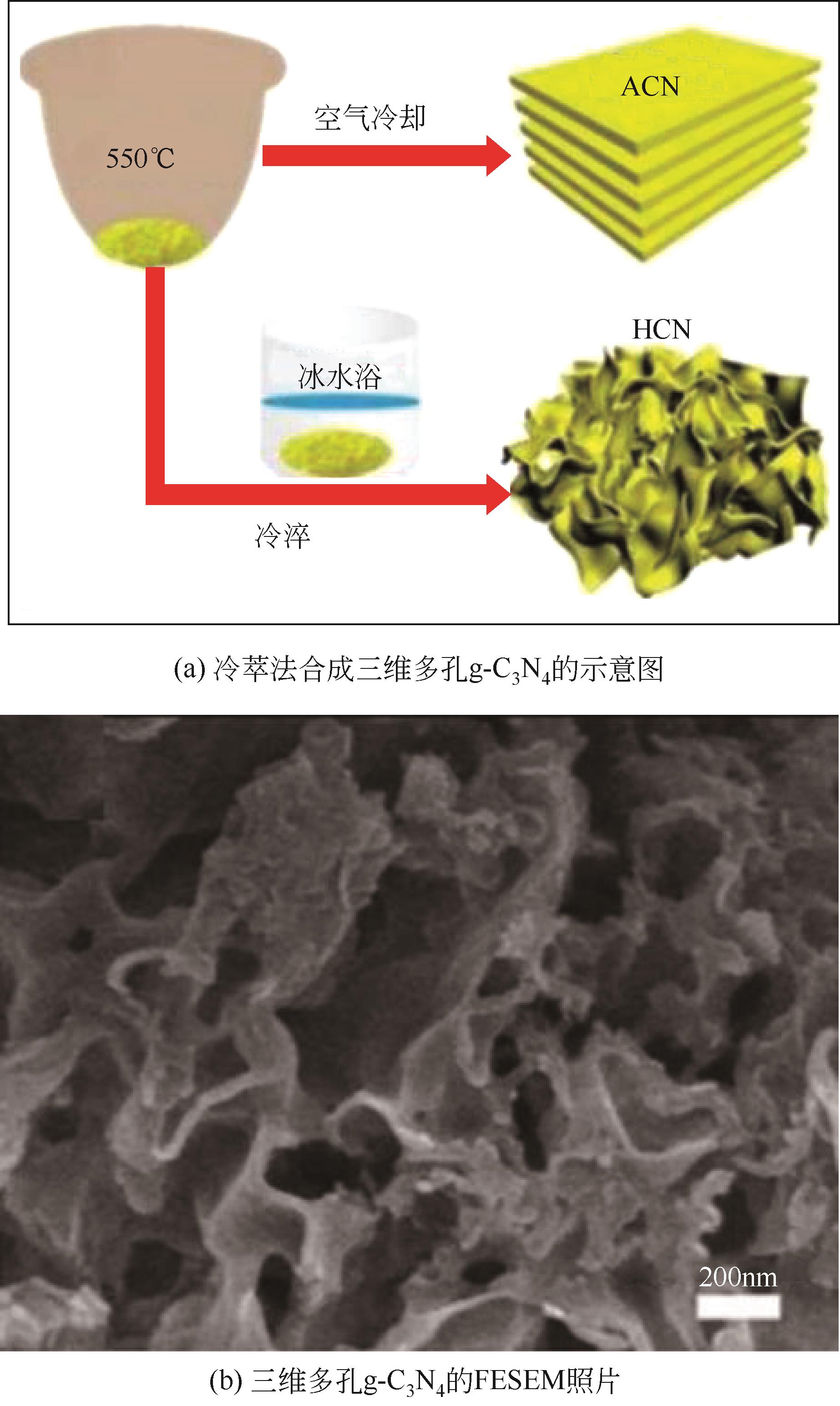化工进展 ›› 2022, Vol. 41 ›› Issue (12): 6430-6442.DOI: 10.16085/j.issn.1000-6613.2022-0365
低维石墨相氮化碳合成方法研究进展
周杰1( ), 孙月1, 包妍1, 刘泽珏1, 张沙沙1, 朱蓓蓓1,2, 王璐1, 管国锋3
), 孙月1, 包妍1, 刘泽珏1, 张沙沙1, 朱蓓蓓1,2, 王璐1, 管国锋3
- 1.南通职业大学药品与环境工程学院,江苏 南通 226007
2.扬州大学化学化工学院,江苏 扬州 225002
3.南京工业大学化工学院,江苏 南京 211816
-
收稿日期:2022-03-10修回日期:2022-04-10出版日期:2022-12-20发布日期:2022-12-29 -
通讯作者:周杰 -
作者简介:周杰(1981—),男,博士,副教授,研究方向为光催化。E-mail:jomole@ntu.edu.cn。 -
基金资助:国家自然科学基金(U19B2001);江苏省“333人才培养工程”;江苏高校“青蓝工程”项目;南通市科技计划项目(JC2020105);江苏省大学生创新创业训练项目;南通职业大学校级课题(21ZK03)
Research progress on modification strategy of graphite carbon nitride based on dimensional regulation
ZHOU Jie1( ), SUN Yue1, BAO Yan1, LIU Zejue1, ZHANG Shasha1, ZHU Beibei1,2, WANG Lu1, GUAN Guofeng3
), SUN Yue1, BAO Yan1, LIU Zejue1, ZHANG Shasha1, ZHU Beibei1,2, WANG Lu1, GUAN Guofeng3
- 1.College of Pharmaceutical and Environmental Engineering, Nantong Vocational University, Nantong 226007, Jiangsu, China
2.College of Chemistry and Chemical Engineering, Yangzhou University, Yangzhou 225002, Jiangsu, China
3.College of Chemical Engineering, Nanjing Tech University, Nanjing 211816, Jiangsu, China
-
Received:2022-03-10Revised:2022-04-10Online:2022-12-20Published:2022-12-29 -
Contact:ZHOU Jie
摘要:
作为一种非金属半导体材料,石墨相氮化碳(g-C3N4)因其独特的物理和化学性质及优异的光催化性能,在能源和环境催化等领域展现出良好的应用前景,但体相g-C3N4存在聚合度低、比表面积小、活性位点少等缺点,制约了其进一步应用。将体相g-C3N4合成为各种低维度g-C3N4是改善上述缺陷的有效策略之一。基于以上改性策略,本文系统介绍了近年来具有零维、一维、二维和三维纳米结构的低维度g-C3N4的主要合成方法,分析了不同维度对g-C3N4的能带结构、光生电子和空穴的产生和转移效率、光吸收能力和光催化性能的影响,总结了不同维度材料在能源和环境催化等领域的具体应用,同时指出目前研究工作普遍存在反应机理不够深入、缺乏大规模合成和工业应用等问题,展望了未来在加强理论深度研究的同时,需要进一步拓展g-C3N4在废水、废气的工业化治理和碳转化等领域的关键技术开发,以期为后续的研究工作提供方向和指引。
中图分类号:
引用本文
周杰, 孙月, 包妍, 刘泽珏, 张沙沙, 朱蓓蓓, 王璐, 管国锋. 低维石墨相氮化碳合成方法研究进展[J]. 化工进展, 2022, 41(12): 6430-6442.
ZHOU Jie, SUN Yue, BAO Yan, LIU Zejue, ZHANG Shasha, ZHU Beibei, WANG Lu, GUAN Guofeng. Research progress on modification strategy of graphite carbon nitride based on dimensional regulation[J]. Chemical Industry and Engineering Progress, 2022, 41(12): 6430-6442.
| 50 | YANG Zitong, LI Lulu, YU Haiyan, et al. Facile synthesis of highly crystalline g-C3N4 nanosheets with remarkable visible light photocatalytic activity for antibiotics removal[J]. Chemosphere, 2021, 271: 129503. |
| 51 | MA Zixuan, ZHOU Peiwen, ZHANG Linping, et al. G-C3N4 nanosheets exfoliated by green wet ball milling process for photodegradation of organic pollutants[J]. Chemical Physics Letters, 2021, 766: 138335. |
| 52 | CHEN Hongmei, FAN Yanyun, XU Hongyan, et al. A facile and green microwave hydrothermal method for fabricating g-C3N4 nanosheets with improved hydrogen evolution performance[J]. Journal of Alloys and Compounds, 2021, 863: 158448. |
| 53 | WANG Longyan, HONG Yuanzhi, LIU Enli, et al. A bottom-up acidification strategy engineered ultrathin g-C3N4 nanosheets towards boosting photocatalytic hydrogen evolution[J]. Carbon, 2020, 163: 234-243. |
| 54 | ZHU Qibin, XUAN Yimin, ZHANG Kai, et al. Enhancing photocatalytic CO2 reduction performance of g-C3N4-based catalysts with non-noble plasmonic nanoparticles[J]. Applied Catalysis B: Environmental, 2021, 297: 120440. |
| 55 | DONG Guohui, ZHANG Lizhi. Porous structure dependent photoreactivity of graphitic carbon nitride under visible light[J]. Journal of Materials Chemistry, 2012, 22(3): 1160-1166. |
| 56 | GUO Qianyi, ZHANG Yuanhao, ZHANG Haishan, et al. 3D foam strutted graphene carbon nitride with highly stable optoelectronic properties[J]. Advanced Functional Materials, 2017, 27(42): 1703711. |
| 57 | TIAN Na, ZHANG Yihe, LI Xiaowei, et al. Precursor-reforming protocol to 3D mesoporous g-C3N4 established by ultrathin self-doped nanosheets for superior hydrogen evolution[J]. Nano Energy, 2017, 38: 72-81. |
| 58 | CHEN Xianjie, SHI Run, CHEN Qian, et al. Three-dimensional porous g-C3N4 for highly efficient photocatalytic overall water splitting[J]. Nano Energy, 2019, 59: 644-650. |
| 59 | YU Weiwei, ZHANG Ting, ZHAO Zhongkui. Garland-like intercalated carbon nitride prepared by an oxalic acid-mediated assembly strategy for highly-efficient visible-light-driven photoredox catalysis[J]. Applied Catalysis B: Environmental, 2020, 278: 119342. |
| 60 | ZHOU Bingxin, DING Shuangshuang, ZHANG Beijing, et al. Dimensional transformation and morphological control of graphitic carbon nitride from water-based supramolecular assembly for photocatalytic hydrogen evolution: from 3D to 2D and 1D nanostructures[J]. Applied Catalysis B: Environmental, 2019, 254: 321-328. |
| 61 | Honghui OU, YANG Pengju, LIN Lihua, et al. Carbon nitride aerogels for the photoredox conversion of water[J]. Angewandte Chemie, 2017, 129(36): 11045-11050. |
| 1 | 梁海欧, 许瞳, 白杰, 等. 类石墨相氮化碳改性研究进展[J]. 化学通报, 2022, 85(1): 72-77, 51. |
| LIANG Haiou, XU Tong, BAI Jie, et al. Research advances in the modification of graphitic carbon nitride[J]. Chemistry, 2022, 85(1): 72-77, 51. | |
| 2 | 郭雅容, 陈志鸿, 刘琼, 等. 石墨相氮化碳光催化剂研究进展[J]. 化工进展, 2016, 35(7): 2063-2070. |
| GUO Yarong, CHEN Zhihong, LIU Qiong, et al. Research progress of graphitic carbon nitride in photocatalysis[J]. Chemical Industry and Engineering Progress, 2016, 35(7): 2063-2070. | |
| 3 | LIU Sen, TIAN Jingqi, WANG Lei, et al. Preparation of photoluminescent carbon nitride dots from CCl4 and 1,2-ethylenediamine: a heat-treatment-based strategy[J]. Journal of Materials Chemistry, 2011, 21(32): 11726-11729. |
| 4 | BARMAN Sudip, SADHUKHAN Mriganka. Facile bulk production of highly blue fluorescent graphitic carbon nitride quantum dots and their application as highly selective and sensitive sensors for the detection of mercuric and iodide ions in aqueous media[J]. Journal of Materials Chemistry, 2012, 22(41): 21832-21837. |
| 5 | GUAN Weiwei, GU Wei, YE Ling, et al. Microwave-assisted polyol synthesis of carbon nitride dots from folic acid for cell imaging[J]. International Journal of Nanomedicine, 2014, 9: 5071-5078. |
| 6 | CAO Xiaotong, MA Jie, LIN Yanping, et al. A facile microwave-assisted fabrication of fluorescent carbon nitride quantum dots and their application in the detection of mercury ions[J]. Spectrochimica Acta Part A: Molecular and Biomolecular Spectroscopy, 2015, 151: 875-880. |
| 7 | ZHOU Juan, YANG Yong, ZHANG Chunyang. A low-temperature solid-phase method to synthesize highly fluorescent carbon nitride dots with tunable emission[J]. Chemical Communications, 2013, 49(77): 8605-8607. |
| 8 | HE Haizhou, LI Jie, LIU Yang, et al. S-C3N4 quantum dot decorated ZnO nanorods to improve their photoelectrochemical performance[J]. Nano, 2017, 12(5): 1750064. |
| 9 | ZHAO Ping, JIN Bo, ZHANG Qingchun, et al. High-quality carbon nitride quantum dots on photoluminescence: effect of carbon sources[J]. Langmuir, 2021, 37(5): 1760-1767. |
| 10 | LI Bo, ZHANG Jing, LUO Ziyu, et al. Amorphous B-doped graphitic carbon nitride quantum dots with high photoluminescence quantum yield of near 90% and their sensitive detection of Fe2+/Cd2+ [J]. Science China Materials, 2021, 64(12): 3037-3050. |
| 62 | SUN Zongzhao, WANG Wu, CHEN Qianwen, et al. A hierarchical carbon nitride tube with oxygen doping and carbon defects promotes solar-to-hydrogen conversion[J]. Journal of Materials Chemistry A, 2020, 8(6): 3160-3167. |
| 63 | WANG Wu, SUN Zongzhao, FENG Jianghe, et al. Three-dimensional insight on formation and light-harvesting of hollow-structure carbon nitride[J]. ACS Applied Energy Materials, 2020, 3(7): 7020-7029. |
| 64 | TONG Zhenwei, YANG Dong, ZHAO Xuyang, et al. Bio-inspired synthesis of three-dimensional porous g-C3N4@carbon microflowers with enhanced oxygen evolution reactivity[J]. Chemical Engineering Journal, 2018, 337: 312-321. |
| 65 | LIANG Qinghua, LI Zhi, YU Xiaoliang, et al. Macroscopic 3D porous graphitic carbon nitride monolith for enhanced photocatalytic hydrogen evolution[J]. Advanced Materials, 2015, 27(31): 4634-4639. |
| 66 | CHEN Zhangfa, LU Shangchen, WU Qianling, et al. Salt-assisted synthesis of 3D open porous g-C3N4 decorated with cyano groups for photocatalytic hydrogen evolution[J]. Nanoscale, 2018, 10(6): 3008-3013. |
| 67 | LIU Mingjin, WAGEH S, AL-GHAMDI Ahmed A, et al. Quenching induced hierarchical 3D porous g-C3N4 with enhanced photocatalytic CO2 reduction activity[J]. Chemical Communications, 2019, 55(93): 14023-14026. |
| 68 | LUO Bing, SONG Rui, GENG Jiafeng, et al. Facile preparation with high yield of a 3D porous graphitic carbon nitride for dramatically enhanced photocatalytic H2 evolution under visible light[J]. Applied Catalysis B: Environmental, 2018, 238: 294-301. |
| 69 | LUO Wenjiao, CHEN Xianjie, WEI Zhen, et al. Three-dimensional network structure assembled by g-C3N4 nanorods for improving visible-light photocatalytic performance[J]. Applied Catalysis B: Environmental, 2019, 255: 117761. |
| 70 | ZENG Zhenxing, QUAN Xie, YU Hongtao, et al. Nanoscale lightning rod effect in 3D carbon nitride nanoneedle: enhanced charge collection and separation for efficient photocatalysis[J]. Journal of Catalysis, 2019, 375: 361-370. |
| 71 | KANG Shifei, LI Xing, YIN Chaochuang, et al. Three-dimensional mesoporous sandwich-like g-C3N4-interconnected CuCo2O4 nanowires arrays as ultrastable anode for fast lithium storage[J]. Journal of Colloid and Interface Science, 2019, 554: 269-277. |
| 72 | OBREGÓN S, VÁZQUEZ A, RUÍZ-GÓMEZ M A, et al. SBA-15 assisted preparation of mesoporous g-C3N4 for photocatalytic H2 production and Au3+ fluorescence sensing[J]. Applied Surface Science, 2019, 488: 205-212. |
| 73 | TALAPANENI Siddulu Naidu, ANANDAN Srinivasan, MANE Gurudas P, et al. Facile synthesis and basic catalytic application of 3D mesoporous carbon nitride with a controllable bimodal distribution[J]. Journal of Materials Chemistry, 2012, 22(19): 9831-9840. |
| 11 | WANG W J, YU J C, SHEN Z R, et al. G-C3N4 quantum dots: direct synthesis, upconversion properties and photocatalytic application[J]. Chemical Communications, 2014, 50(70): 10148-10150. |
| 12 | ZHANG Xiaodong, WANG Hongxia, WANG Hui, et al. Single-layered graphitic-C3N4 quantum dots for two-photon fluorescence imaging of cellular nucleus[J]. Advanced Materials, 2014, 26(26): 4438-4443. |
| 13 | ZHAN Yan, LIU Zhiming, LIU Qingqing, et al. A facile and one-pot synthesis of fluorescent graphitic carbon nitride quantum dots for bio-imaging applications[J]. New Journal of Chemistry, 2017, 41(10): 3930-3938. |
| 14 | HE Xingchen, LIU Yanliang, BUTCH Christopher J, et al. One-pot exfoliation of graphitic C3N4 quantum dots for blue QLEDs by methylamine intercalation[J]. Small, 2019, 15(44): 1902735. |
| 15 | WANG Haiyan, LU Qiujun, LI Mingxia, et al. Electrochemically prepared oxygen and sulfur co-doped graphitic carbon nitride quantum dots for fluorescence determination of copper and silver ions and biothiols[J]. Analytica Chimica Acta, 2018, 1027: 121-129. |
| 16 | 王庆, 陈宇飞, 李萍, 等. 石墨相氮化碳量子点的合成及应用的研究进展[J]. 化学通报, 2020, 83(3): 218-225, 264. |
| WANG Qing, CHEN Yufei, LI Ping, et al. Research advances in the synthesis and applications of graphitic carbon nitride quantum dots[J]. Chemistry, 2020, 83(3): 218-225, 264. | |
| 17 | XIE Hangqing, FU Yao, ZHANG Qizhen, et al. Selective and high-sensitive label-free detection of ascorbic acid by carbon nitride quantum dots with intense fluorescence from lone pair states[J]. Talanta, 2019, 196: 530-536. |
| 18 | LI Xinhao, ZHANG Jinshui, CHEN Xiufang, et al. Condensed graphitic carbon nitride nanorods by nanoconfinement: promotion of crystallinity on photocatalytic conversion[J]. Chemistry of Materials, 2011, 23(19): 4344-4348. |
| 19 | BIAN Shaowei, MA Zhuo, SONG Weiguo. Preparation and characterization of carbon nitride nanotubes and their applications as catalyst supporter[J]. The Journal of Physical Chemistry C, 2009, 113(20): 8668-8672. |
| 20 | ZHANG Jinshui, GUO Fangsong, WANG Xinchen. An optimized and general synthetic strategy for fabrication of polymeric carbon nitride nanoarchitectures[J]. Advanced Functional Materials, 2013, 23(23): 3008-3014. |
| 21 | SUN Jianhua, ZHANG Jinshui, ZHANG Mingwen, et al. Bioinspired hollow semiconductor nanospheres as photosynthetic nanoparticles[J]. Nature Communications, 2012, 3: 1139. |
| 22 | LIU Jian, ANTONIETTI Markus. Bio-inspired NADH regeneration by carbon nitride photocatalysis using diatom templates[J]. Energy & Environmental Science, 2013, 6(5): 1486-1493. |
| 23 | XIE Meng, WEI Wei, JIANG Zhifeng, et al. Carbon nitride nanowires/nanofibers: a novel template-free synthesis from a cyanuric chloride-melamine precursor towards enhanced adsorption and visible-light photocatalytic performance[J]. Ceramics International, 2016, 42(3): 4158-4170. |
| 24 | BAI Xiaojuan, WANG Li, ZONG Ruilong, et al. Photocatalytic activity enhanced via g-C3N4 nanoplates to nanorods[J]. The Journal of Physical Chemistry C, 2013, 117(19): 9952-9961. |
| 25 | ZENG Yunxiong, LIU Xia, LIU Chengbin, et al. Scalable one-step production of porous oxygen-doped g-C3N4 nanorods with effective electron separation for excellent visible-light photocatalytic activity[J]. Applied Catalysis B: Environmental, 2018, 224: 1-9. |
| 26 | TANG Yunqi, YUAN Meng, JIANG Baojiang, et al. Inorganic acid-derived hydrogen-bonded organic frameworks to form nitrogen-rich carbon nitrides for photocatalytic hydrogen evolution[J]. Journal of Materials Chemistry A, 2017, 5(41): 21979-21985. |
| 27 | TAHIR Muhammad, CAO Chuanbao, MAHMOOD Nasir, et al. Multifunctional g-C3N4 nanofibers: a template-free fabrication and enhanced optical, electrochemical, and photocatalyst properties[J]. ACS Applied Materials & Interfaces, 2014, 6(2): 1258-1265. |
| 28 | ZHANG Kan, WANG Luyang, SHENG Xiaowei, et al. Tunable bandgap energy and promotion of H2O2 oxidation for overall water splitting from carbon nitride nanowire bundles[J]. Advanced Energy Materials, 2016, 6(11): 1502352. |
| 29 | LI Xiang, WANG Tao, DUAN Pu, et al. Carbon nitride nanothread crystals derived from pyridine[J]. Journal of the American Chemical Society, 2018, 140(15): 4969-4972. |
| 30 | TANG Zhiwei, ZHANG Xueyu, DUAN Lianfeng, et al. Three-dimensional carbon nitride nanowire scaffold for flexible supercapacitors[J]. Nanoscale Research Letters, 2019, 14(1): 98. |
| 31 | WU Jiaojiao, LI Nan, ZHANG Xiaohong, et al. Heteroatoms binary-doped hierarchical porous g-C3N4 nanobelts for remarkably enhanced visible-light-driven hydrogen evolution[J]. Applied Catalysis B: Environmental, 2018, 226: 61-70. |
| 32 | ZHAO Xinyu, ZHANG Yi, ZHAO Xia, et al. Urea and melamine formaldehyde resin-derived tubular g-C3N4 with highly efficient photocatalytic performance[J]. ACS Applied Materials & Interfaces, 2019, 11(31): 27934-27943. |
| 33 | YAN Xiaoxiao, JIA Zhiyuan, CHE Haibing, et al. A selective ion replacement strategy for the synthesis of copper doped carbon nitride nanotubes with improved photocatalytic hydrogen evolution[J]. Applied Catalysis B: Environmental, 2018, 234: 19-25. |
| 34 | GUO Shien, DENG Zhaopeng, LI Mingxia, et al. Phosphorus-doped carbon nitride tubes with a layered micro-nanostructure for enhanced visible-light photocatalytic hydrogen evolution[J]. Angewandte Chemie, 2016, 128(5): 1862-1866. |
| 35 | GUO Shien, TANG Yunqi, XIE Ying, et al. P-doped tubular g-C3N4 with surface carbon defects: universal synthesis and enhanced visible-light photocatalytic hydrogen production[J]. Applied Catalysis B: Environmental, 2017, 218: 664-671. |
| 36 | WANG Wenjun, NIU Qiuya, ZENG Guangming, et al. 1D porous tubular g-C3N4 capture black phosphorus quantum dots as 1D/0D metal-free photocatalysts for oxytetracycline hydrochloride degradation and hexavalent chromium reduction[J]. Applied Catalysis B: Environmental, 2020, 273: 119051. |
| 37 | LIU Zhifeng, HUANG Jing, SHAO Binbin, et al. In-situ construction of 2D/1D Bi2O2CO3 nanoflake/S-doped g-C3N4 hollow tube hierarchical heterostructure with enhanced visible-light photocatalytic activity[J]. Chemical Engineering Journal, 2021, 426: 130767. |
| 38 | ZHANG Xiaodong, XIE Xiao, WANG Hui, et al. Enhanced photoresponsive ultrathin graphitic-phase C3N4 nanosheets for bioimaging[J]. Journal of the American Chemical Society, 2013, 135(1): 18-21. |
| 39 | YANG Shubin, GONG Yongji, ZHANG Jinshui, et al. Exfoliated graphitic carbon nitride nanosheets as efficient catalysts for hydrogen evolution under visible light[J]. Advanced Materials, 2013, 25(17): 2452-2456. |
| 40 | LIN Qiuyan, LI Li, LIANG Shijing, et al. Efficient synthesis of monolayer carbon nitride 2D nanosheet with tunable concentration and enhanced visible-light photocatalytic activities[J]. Applied Catalysis B: Environmental, 2015, 163: 135-142. |
| 41 | SANO Taizo, TSUTSUI Sakiko, KOIKE Kazuhide, et al. Activation of graphitic carbon nitride (g-C3N4) by alkaline hydrothermal treatment for photocatalytic NO oxidation in gas phase[J]. Journal of Materials Chemistry A, 2013, 1(21): 6489-6496. |
| 42 | LIANG Qinghua, LI Zhi, BAI Yu, et al. Reduced-sized monolayer carbon nitride nanosheets for highly improved photoresponse for cell imaging and photocatalysis[J]. Science China Materials, 2017, 60(2): 109-118. |
| 43 | NIU Ping, ZHANG Lili, LIU Gang, et al. Graphene-like carbon nitride nanosheets for improved photocatalytic activities[J]. Advanced Functional Materials, 2012, 22(22): 4763-4770. |
| 44 | DONG Fan, LI Yuhan, WANG Zhenyu, et al. Enhanced visible light photocatalytic activity and oxidation ability of porous graphene-like g-C3N4 nanosheets via thermal exfoliation[J]. Applied Surface Science, 2015, 358: 393-403. |
| 45 | LI Yunfeng, JIN Renxi, XING Yan, et al. Macroscopic foam-like holey ultrathin g-C3N4 nanosheets for drastic improvement of visible-light photocatalytic activity[J]. Advanced Energy Materials, 2016, 6(24): 1601273. |
| 46 | YANG Shubin, FENG Xinliang, WANG Xinchen, et al. Graphene-based carbon nitride nanosheets as efficient metal-free electrocatalysts for oxygen reduction reactions[J]. Angewandte Chemie, 2011, 50(23): 5339-5343. |
| 47 | XING Weinan, TU Wenguang, HAN Zhonghui, et al. Template-induced high-crystalline g-C3N4 nanosheets for enhanced photocatalytic H2 evolution[J]. ACS Energy Letters, 2018, 3(3): 514-519. |
| 48 | VILLALOBOS Luis Francisco, VAHDAT Mohammad Tohidi, DAKHCHOUNE Mostapha, et al. Large-scale synthesis of crystalline g-C3N4 nanosheets and high-temperature H2 sieving from assembled films[J]. Science Advances, 2020, 6(4): eaay9851. |
| 49 | ABDELHAFEEZ Islam A, CHEN Jiabin, ZHOU Xuefei. Scalable one-step template-free synthesis of ultralight edge-functionalized g-C3N4 nanosheets with enhanced visible light photocatalytic performance[J]. Separation and Purification Technology, 2020, 250: 117085. |
| 74 | PATNAIK Sulagna, SAHOO Dipti Prava, PARIDA K M. Bimetallic co-effect of Au-Pd alloyed nanoparticles on mesoporous silica modified g-C3N4 for single and simultaneous photocatalytic oxidation of phenol and reduction of hexavalent chromium[J]. Journal of Colloid and Interface Science, 2020, 560: 519-535. |
| 75 | WANG Xueli, LIU Qiong, YANG Qian, et al. Three-dimensional g-C3N4 aggregates of hollow bubbles with high photocatalytic degradation of tetracycline[J]. Carbon, 2018, 136: 103-112. |
| 76 | SHANG Yanyang, CHEN Xi, LIU Wenwen, et al. Photocorrosion inhibition and high-efficiency photoactivity of porous g-C3N4/Ag2CrO4 composites by simple microemulsion-assisted co-precipitation method[J]. Applied Catalysis B: Environmental, 2017, 204: 78-88. |
| 77 | BENISTI Itamar, SHAIK Firdoz, XING Zheng, et al. The effect of Pt cocatalyst on the performance and transient IR spectrum of photocatalytic g-C3N4 nanospheres[J]. Applied Surface Science, 2021, 542: 148432. |
| 78 | LIN Bo, YANG Guidong, WANG Lianzhou. Stacking-layer-number dependence of water adsorption in 3D ordered close-packed g-C3N4 nanosphere arrays for photocatalytic hydrogen evolution[J]. Angewandte Chemie International Edition, 2019, 58(14): 4587-4591. |
| 79 | HAO Qiang, CHEN Tong, WANG Ruiting, et al. A separation-free polyacrylamide/bentonite/graphitic carbon nitride hydrogel with excellent performance in water treatment[J]. Journal of Cleaner Production, 2018, 197: 1222-1230. |
| [1] | 时永兴, 林刚, 孙晓航, 蒋韦庚, 乔大伟, 颜彬航. 二氧化碳加氢制甲醇过程中铜基催化剂活性位点研究进展[J]. 化工进展, 2023, 42(S1): 287-298. |
| [2] | 杨霞珍, 彭伊凡, 刘化章, 霍超. 熔铁催化剂活性相的调控及其费托反应性能[J]. 化工进展, 2023, 42(S1): 310-318. |
| [3] | 赵巍, 赵德银, 李世瀚, 刘洪达, 孙进, 郭艳秋. 三嗪型天然气管道缓蚀型减阻剂合成与应用[J]. 化工进展, 2023, 42(S1): 391-399. |
| [4] | 王正坤, 黎四芳. 双子表面活性剂癸炔二醇的绿色合成[J]. 化工进展, 2023, 42(S1): 400-410. |
| [5] | 王晨, 白浩良, 康雪. 大功率UV-LED散热与纳米TiO2光催化酸性红26耦合系统性能[J]. 化工进展, 2023, 42(9): 4905-4916. |
| [6] | 向阳, 黄寻, 魏子栋. 电催化有机合成反应的活性和选择性调控研究进展[J]. 化工进展, 2023, 42(8): 4005-4014. |
| [7] | 黄玉飞, 李子怡, 黄杨强, 金波, 罗潇, 梁志武. 光催化CO2和CH4重整催化剂研究进展[J]. 化工进展, 2023, 42(8): 4247-4263. |
| [8] | 郭立行, 庞蔚莹, 马克遥, 杨镓涵, 孙泽辉, 张盼, 付东, 赵昆. 层序空间多孔结构TiO2实现高效光催化CO2还原[J]. 化工进展, 2023, 42(7): 3643-3651. |
| [9] | 陆洋, 周劲松, 周启昕, 王瑭, 刘壮, 李博昊, 周灵涛. CeO2/TiO2吸附剂煤气脱汞产物的浸出规律[J]. 化工进展, 2023, 42(7): 3875-3883. |
| [10] | 陈森, 殷鹏远, 杨证禄, 莫一鸣, 崔希利, 锁显, 邢华斌. 功能固体材料智能合成研究进展[J]. 化工进展, 2023, 42(7): 3340-3348. |
| [11] | 王帅旗, 王从新, 王学林, 田志坚. 无溶剂快速合成ZSM-12分子筛[J]. 化工进展, 2023, 42(7): 3561-3571. |
| [12] | 余希希, 张金帅, 雷文, 刘承果. 基于动态共价键自修复的光固化高分子材料研究进展[J]. 化工进展, 2023, 42(7): 3589-3599. |
| [13] | 王知彩, 刘伟伟, 周璁, 潘春秀, 闫洪雷, 李占库, 颜井冲, 任世彪, 雷智平, 水恒福. 基于煤基腐殖酸的高效减水剂合成与性能表征[J]. 化工进展, 2023, 42(7): 3634-3642. |
| [14] | 刘宇龙, 姚俊虎, 舒闯闯, 佘跃惠. 磁性Fe3O4纳米颗粒的生物合成及其在提高采收率中的应用[J]. 化工进展, 2023, 42(5): 2464-2474. |
| [15] | 张宁, 吴海滨, 李钰, 李剑锋, 程芳琴. 漂浮型光催化材料的制备及其在水处理领域的应用研究进展[J]. 化工进展, 2023, 42(5): 2475-2485. |
| 阅读次数 | ||||||
|
全文 |
|
|||||
|
摘要 |
|
|||||
